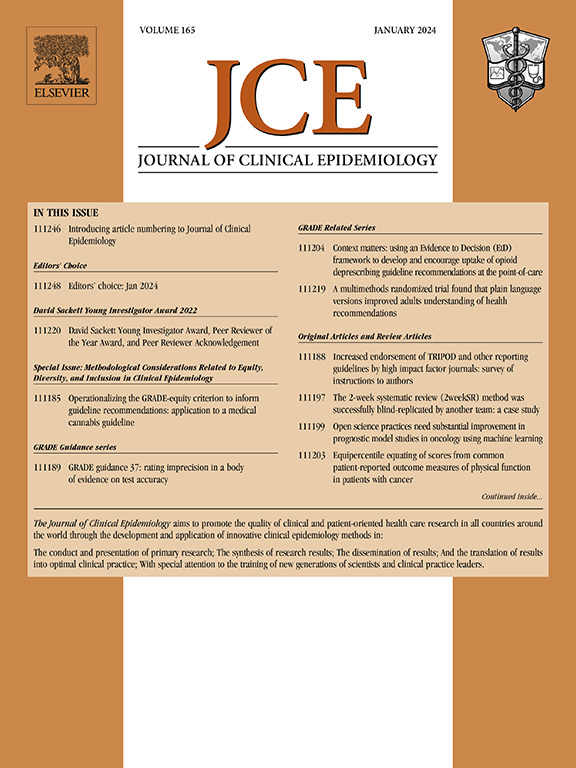在试验水平的替代终点评估中纳入比较观察性证据:评估急性髓系白血病移植后患者的无复发生存作为总生存的替代终点。
IF 5.2
2区 医学
Q1 HEALTH CARE SCIENCES & SERVICES
引用次数: 0
摘要
目的:总生存期(OS)是肿瘤试验中评估治疗获益的金标准。然而,OS需要长时间的患者随访,并且可能被相互竞争的风险所混淆。本研究旨在评估无复发生存期(RFS)作为急性髓性白血病(AML) OS的试验水平替代终点的有效性,并开发新的方法来结合随机对照试验(rct)和比较观察性证据(COE)研究的数据。研究设计和背景:对接受造血干细胞移植(HSCT)维持治疗的成年AML患者的RFS和OS治疗效果的rct和COE研究进行了系统评价。使用贝叶斯元分析模型来评估RFS-OS代理关系,并开发了统计方法来实现rct和COE研究之间的信息共享,包括自适应和用户指定的方式。结果:确定了6项rct和14项COE研究。对RCT数据的分析表明,替代关系较弱,获得的参数具有相当大的不确定性。从自适应和用户控制的方式中借鉴COE的优势,产生了具有更精确参数的更强的RFS-OS代理关系,并且自适应信息共享模型并不表明rct和COE之间存在任何先验数据冲突。结论:我们提供的证据表明,在hsct后AML患者中,RFS-OS存在潜在的替代关系。我们从COE中借用信息的新方法减少了这种代理关系中的不确定性,缓解了RCT证据基础有限的问题。临床试验:gov标识符:无。本文章由计算机程序翻译,如有差异,请以英文原文为准。
Including comparative observational evidence in trial-level surrogate end point evaluation: assessing relapse-free survival as a surrogate end point for overall survival in patients with acute myeloid leukemia posttransplant
Objectives
Overall survival (OS) is the gold standard outcome for the assessment of treatment benefits in oncology trials. However, OS requires lengthy patient follow-up and can be confounded by competing risks. This study aims to assess the validity of relapse-free survival (RFS) as a trial-level surrogate end point for OS in acute myeloid leukemia (AML) and develop novel methods to combine data from randomized controlled trials (RCTs) and comparative observational evidence (COE) studies.
Study Design and Setting
A systematic review was conducted to identify RCTs and COE studies reporting treatment effects on both RFS and OS in adult patients with AML receiving posthematopoietic stem-cell transplant (HSCT) maintenance therapy. Bayesian meta-analytic models were used to evaluate the RFS–OS surrogate relationship, and statistical methods were developed to enable information sharing, in both adaptive and user-specified manners, between RCTs and COE studies.
Results
Six RCTs and 14 COE studies were identified. Analysis of RCT data resulted in a weaker surrogate relationship, with parameters obtained with considerable uncertainty. Borrowing strength from COE studies, in both an adaptive and a user-controlled fashion, resulted in a stronger RFS–OS surrogate relationship with more precise parameters, and adaptive information-sharing models did not suggest any prior-data conflict between the RCTs and COE studies.
Conclusion
We present evidence for a potential RFS–OS surrogate relationship in patients with AML post-HSCT. Our novel methodology for borrowing information from COE studies reduced uncertainty in this surrogate relationship, alleviating the issue of a limited RCT evidence base.
求助全文
通过发布文献求助,成功后即可免费获取论文全文。
去求助
来源期刊

Journal of Clinical Epidemiology
医学-公共卫生、环境卫生与职业卫生
CiteScore
12.00
自引率
6.90%
发文量
320
审稿时长
44 days
期刊介绍:
The Journal of Clinical Epidemiology strives to enhance the quality of clinical and patient-oriented healthcare research by advancing and applying innovative methods in conducting, presenting, synthesizing, disseminating, and translating research results into optimal clinical practice. Special emphasis is placed on training new generations of scientists and clinical practice leaders.
 求助内容:
求助内容: 应助结果提醒方式:
应助结果提醒方式:


